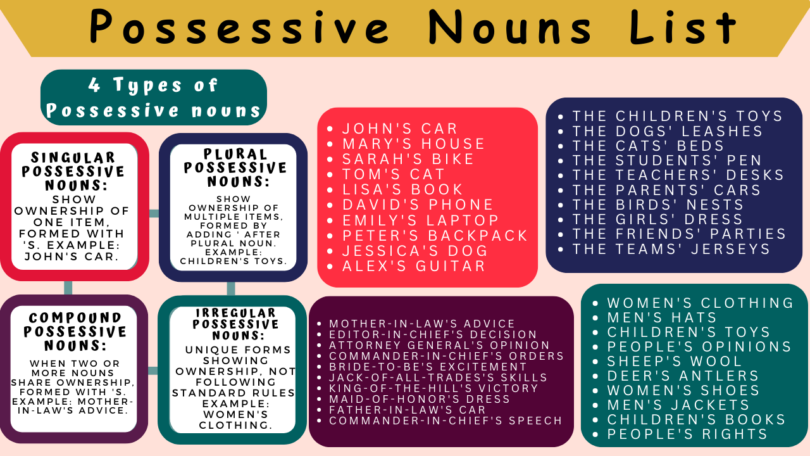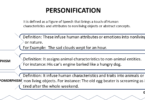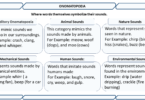Understanding who or what owns something is made easier by possessive nouns. Furthermore, it may be used for attributes, items, and a variety of other helpful grammatical concepts. We will look at possessive nouns in this Article, including a list and their definition and examples, as well as their exercise and how to employ them in Sentences.
What is this Possessive Noun?
Possessive Nouns tell us about ownership. For example, you can say that it is Momna’s website. The word ‘Momna’s’ is a possessive noun. Any noun, including abstract ones, can acquire the possessive form. For Example Momna > Momna’s and Kashif > Kashif’s.
Kinds of Possessive Nouns in English Grammar:
- Singular Possessive Nouns
- Plural Possessive Nouns
- Compound Possessive Nouns
- irregular possessive nouns
Possessive Nouns List, Definition, Examples:
Singular Possessive Nouns:
Singular possessive nouns show ownership or possession of one item. They are formed by adding an apostrophe and the letter “s” (‘s) to the singular noun.Example Singular Possessive Nouns:
- Dog’s
- Cat’s
- Mary’s
- Book’s
- Car’s
Example Sentences of Singular Possessive Nouns:
- Dog’s bone is buried in the backyard.
- Cat’s whiskers twitched with curiosity.
- Mary’s backpack is by the door.
- Book’s pages were filled with adventure.
- Car’s engine roared to life.
Plural Possessive Nouns:
- Dogs’
- Cats’
- Students’
- Books’
- Cars’
Plural Possessive Nouns Example Sentences:
- The dogs’ tails wagged happily.
- The cats’ food bowls were empty.
- The students’ scattered their backpacks on the floor.
- Books’ covers filled the library shelves.
- The parking lot was full of cars’ headlights.
Compound Possessive Nouns:
- Mother-in-law’s
- Editor-in-chief’s
- President-elect’s
- Attorney general’s
- Commander-in-chief’s
Compound Possessive Nouns Example Sentences:
- The mother-in-law’s advice was valuable.
- The editor-in-chief’s decision was final.
- The president-elect’s speech was inspiring.
- The attorney general’s opinion was sought after.
- The commander-in-chief’s orders were clea
Irregular Possessive Nouns:
Irregular possessive nouns do not follow the standard rules for forming possessives. They have unique forms for indicating ownership.Example Irregular Possessive Nouns:
- Women’s
- Men’s
- Children’s
- People’s
- Sheep’s
Irregular Possessive Nouns Example Sentences:
- The store sells a variety of women’s clothing.
- The locker room is for men’s use only.
- The playground is reserved for children’s activities.
- The organization aims to improve people’s lives.
- The farm has a flock of sheep’s wool.
Exercise for Possessive Nouns in English:
- Singular Possessive Nouns:
- The phrases below should be rewritten using singular possessive nouns:
- The car belonging to John.
- The house of Mary.
- The bike owned by Sarah.
- The phrases below should be rewritten using singular possessive nouns:
- Plural Possessive Nouns:
- Rewrite these phrases with numerous possessive nouns:
- The toys belonging to the children.
- The books owned by the students.
- The cars of the employees.
- Rewrite these phrases with numerous possessive nouns:
- Compound Possessive Nouns:
- Combine the following noun pairs to form compound possessive nouns:
- The parents and the children
- The company and the employees
- The teacher and the students
- Combine the following noun pairs to form compound possessive nouns:
- Irregular Possessive Nouns:
- The phrases below should be rewritten with irregular possessive nouns:
- The clothes belonging to women.
- The shoes owned by men.
- The toys of children.
- The phrases below should be rewritten with irregular possessive nouns:
Possessive Nouns list in English:
- Children’s toys
- Dogs’ leashes
- Cats’ beds
- Students’ backpacks
- Teachers’ desks
- Parents’ cars
- Birds’ nests
- Employees’ uniforms
- Friends’ parties
- Teams’ jerseys
- Houses’ roofs
- Computers’ keyboards
- Gardens’ flowers
- Rivers’ banks
- Cows’ milk
- Horses’ saddles
- Trees’ branches
- Villagers’ homes
- Nations’ flags
- Doctors’ offices
- Lawyers’ briefcases
- Drivers’ licenses
- Authors’ books
- Musicians’ instruments
- Artists’ galleries
- Workers’ tools
- Presidents’ speeches
- Athletes’ medals
- Scientists’ discoveries
- Actors’ costumes
- Dancers’ routines
- Tourists’ cameras
- Bakers’ ovens
- Farmers’ crops
- Fishermen’s nets
- Sailors’ knots
- Explorers’ maps
- Students’ notebooks
- Teachers’ lessons







